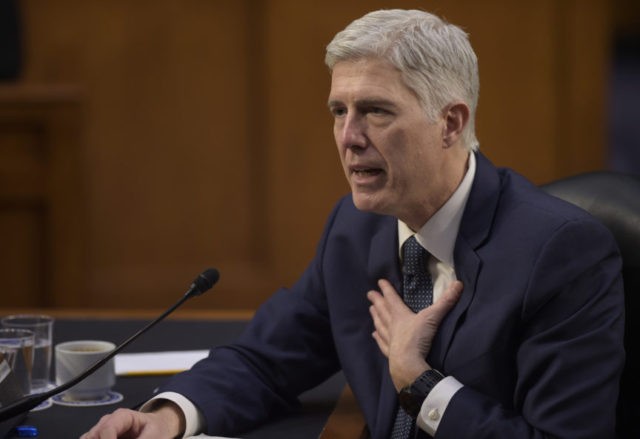The United States Supreme Court on Tuesday heard oral arguments on two cases that ask the court to expand the sex discrimination protections in the Civil Rights Act of 1964 to cover homosexuals and transgenders.
Bostock v. Clayton County Georgia and Altitude Express, Inc. v. Zarada were brought by homosexual men who claimed they were fired because of their sexual orientation.
R.G. & G.R. Harris Funeral Homes, Inc. v. EEOC centers on a man who was fired after he announced he had changed his name and would now be coming to work as a woman. The business’s sex-specific dress code required women to wear skirts as their work uniform.
Justice Neil Gorsuch had an exchange with David Cole, attorney for Aimee Stephens, who was William Stephens for the six years he worked at the funeral home, first as an apprentice and then as a funeral director and embalmer.
Cole said that Stephens would have been fired even if he complied with the dress code for women in the funeral home because he was a man, a clear case of sex discrimination, he argued. Gorsuch said:
I guess I — I’d just like you to have a chance to respond to Judge Lynch in his thoughtful dissent in which he lamented everything you have before us, but suggested that something as drastic a change in this country as bathrooms in every place of employment and dress codes in every place of employment that are otherwise gender neutral would be changed, that that — that that’s an essentially legislative decision.
“Judge Lynch is a very thoughtful judge and — and wrote a very thoughtful opinion that I — I think he probably regretted having to write,” Gorsuch said. “What do you say to him?”
Cole said:
I say that recognizing that transgender people have a right to exist in the workplace and not be turned away because of who they are does not end dress codes or restrooms. There are transgender lawyers in this courtroom today.
“Of course, there are,” Gorsuch said. “That’s not the question, Mr. Cole.”
“Mr. Cole, the question is a matter of the judicial role and the modesty in interpreting statutes that are old. And that’s the question he posed,” Gorsuch said.
“Nobody is questioning, and he certainly did not, the legitimacy of the claims and the importance of them,” Gorsuch said.
“The question is about judicial interpretation,” Gorsuch said. “If you wish to address it.”
Cole said that the Plaintiff was not asking to change the definition of sex as it was defined in 1964 but argued that it was because of his sex as a man who wanted “to present” as a woman that caused the termination.
Gorsuch responded that the case could be close on the “textual” review of the 1964 law but that social implications are much broader. He said:
At the end of the day, should he or she take into consideration the massive social upheaval that would be entailed in such a decision, and the possibility that — that Congress didn’t think about it. That is more effective — more appropriate a legislative rather than a judicial function?
But Cole argued transgenders are not “disruptive.”
“So, first of all, federal courts of appeals have been recognizing that discrimination against transgender people is sex discrimination for 20 years,” Cole said. “There’s been no upheaval.”
“As I was saying, there are transgender male lawyers in this courtroom following the male dress code and going to the men’s room and the Court’s dress code and sex-segregated restrooms have not fallen,” Cole added.
“So the notion that somehow this is going to be a huge upheaval, we haven’t seen that upheaval for 20 years, there’s no reason you — you would see that upheaval,” Cole said. “Transgender people follow the rule that’s associated with their gender identity.”
“It’s not disruptive,” Cole said.
In previewing the cases, Steven D. Schwinn, professor of law at the University of Illinois Chicago John Marshall Law School, said that the court’s ruling “matters deeply to the estimated 11.3 million LGBTQ adults in the United States.”
But “employers, the government and their amici argue that the plaintiff’s reading of Title VII would so ‘expand’ the concept of “sex” that employers would not know show to comply, and courts would not know how to enforce it.”
Schwinn wrote:
Moreover, the defendants and their amici argue that the plaintiffs’ reading of Title VII could mean the end of things like sex-specific restrooms and locker rooms and this could actually undermine Title VII by threatening other sex specific practices and institutions that are designed to provide an equal playing field between men and women.
These cases are Bostock v. Clayton County Georgia, No. 17-1618, Altitude Express, Inc. v. Zarda, No. 17-1623, and R.G. &G.R. Harris Funeral Homes, Inc. v. EEOC, No. 18-107 in the Supreme Court of the United States.
Follow Penny Starr on Twitter

COMMENTS
Please let us know if you're having issues with commenting.